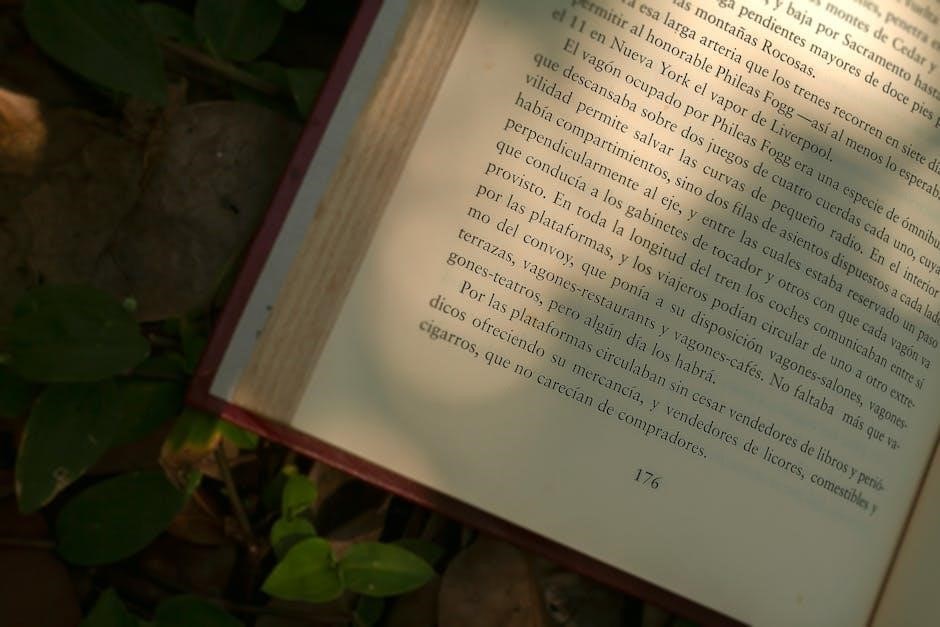Act 3 of Romeo and Juliet is a pivotal moment, marking the escalation of conflicts and emotional intensity. It sets the stage for tragic events that shape the play’s outcome, revealing the characters’ deepest struggles and the inevitability of their fate.
Overview of Act 3
Act 3 of Romeo and Juliet is a turning point in the play, marked by escalating tensions and tragic events. The act begins with the deadly fight between Tybalt and Mercutio, leading to Mercutio’s death and Romeo’s impulsive revenge. Romeo kills Tybalt, resulting in his banishment from Verona. Meanwhile, Juliet faces her own turmoil as her parents arrange her marriage to Paris, forcing her to defy them. The act explores the consequences of impulsive actions, the deepening feud between the Montagues and Capulets, and the emotional struggles of the protagonists. These events set the stage for the play’s tragic conclusion, highlighting the inevitability of fate.
Significance of Act 3 in the Play
Act 3 is a pivotal section of Romeo and Juliet, as it accelerates the tragic progression of events and deepens the emotional stakes. The act showcases the devastating consequences of impulsive actions, such as Romeo’s killing of Tybalt and his subsequent banishment, which irreparably alter the characters’ lives. It also highlights the escalating feud between the Montagues and Capulets, emphasizing the futility of their hatred. Furthermore, Act 3 underscores the central themes of love versus hate, fate versus free will, and the destructive nature of unchecked emotions. These elements collectively set the stage for the play’s heartbreaking conclusion, making Act 3 indispensable to the narrative’s tragic unfolding.
Key Themes in Act 3
Act 3 of Romeo and Juliet explores several profound themes that drive the play’s tragic narrative. Love and duty collide, as Juliet faces pressure to marry Paris while remaining devoted to Romeo. Fate versus free will is prominent, as characters’ choices lead to irreversible consequences. Impulsiveness is a recurring motif, with Mercutio’s death and Romeo’s rash actions underscoring the dangers of unchecked emotions. Additionally, the theme of hate versus love intensifies, as the feud between the Montagues and Capulets escalates. These themes intertwine to create a sense of inevitability, highlighting the destructive power of conflict and the enduring strength of love, even in the face of adversity.

Scene 1: The Fight Between Tybalt and Mercutio
Tybalt challenges Romeo to a duel, but Romeo refuses due to his secret marriage to Juliet. Mercutio steps in, leading to a tragic confrontation and Mercutio’s fatal wound.
Tybalt’s Challenge to Romeo
Tybalt, seeking revenge for Romeo’s uninvited presence at the Capulets’ ball, confronts him in Verona’s streets. Driven by pride and a deep-seated hatred for the Montagues, Tybalt accuses Romeo of being a coward and a deceitful lover. He taunts Romeo, provoking him to fight, but Romeo, now married to Juliet, refuses to engage, hoping to avoid further conflict. Tybalt’s challenge escalates tensions, showcasing his fiery temperament and rigid adherence to family honor. This confrontation sets the stage for the tragic events that unfold, highlighting the destructive nature of the feud between the two families.
Mercutio’s Role in the Fight
Mercutio, Romeo’s loyal and witty friend, plays a pivotal role in the fight with Tybalt. When Tybalt challenges Romeo, Mercutio, offended by Tybalt’s insults, steps in to defend his friend’s honor. Despite Romeo’s refusal to fight, Mercutio accepts the duel, showcasing his bravery and strong sense of loyalty. His quick wit and sharp tongue escalate the tension, leading to a fierce confrontation. Tragically, Mercutio is fatally stabbed by Tybalt, and his death serves as a turning point in the play, provoking Romeo’s rage and leading to Tybalt’s demise. Mercutio’s fiery personality and ultimate sacrifice highlight the devastating consequences of the feud.
Romeo’s Refusal to Fight Tybalt
Romeo’s refusal to fight Tybalt in Act 3, Scene 1, stems from his secret marriage to Juliet, making him reluctant to engage in violence with her relative. Despite Tybalt’s insults and provocations, Romeo remains calm, insisting he bears Tybalt no hatred. This decision highlights Romeo’s internal conflict between loyalty to his friend Mercutio and his newfound commitment to peace through his union with Juliet. Romeo’s passive stance infuriates Mercutio, who steps in to defend Romeo’s honor, leading to tragic consequences. Romeo’s refusal underscores his evolving character, as he prioritizes love and reconciliation over the feud’s cycle of hatred and revenge, showcasing a deeper maturity and understanding of the conflict’s futility.
The Death of Mercutio
Mercutio’s death in Act 3, Scene 1, is a pivotal and tragic moment in the play. When Romeo refuses to fight Tybalt, Mercutio steps in to defend his honor. Despite his wit and bravery, Mercutio is fatally wounded by Tybalt’s sword. As he dies, Mercutio curses both families, blaming them for his fate. His final words, “A plague o’ both your houses,” reflect his anger and frustration with the ongoing feud. Mercutio’s death deeply grieves Romeo, spurring him to avenge his friend by killing Tybalt, which leads to Romeo’s banishment and escalates the tragic events of the play. Mercutio’s loss underscores the senseless violence fueled by the families’ hatred.
Romeo’s Reaction to Mercutio’s Death
Romeo is consumed by shock and anguish upon witnessing Mercutio’s death. Initially, he appears calm and reluctant to fight Tybalt, but Mercutio’s fatal wound ignites a deep rage within him. Overcome with grief and a thirst for vengeance, Romeo confronts and kills Tybalt, abandoning his earlier resolve to avoid violence. This impulsive act highlights Romeo’s emotional instability and the overwhelming impact of his friend’s death. Romeo’s reaction not only seals his fate but also intensifies the deadly feud between the Montagues and Capulets, leading to his banishment and further tragic consequences. His actions underscore the destructive power of unchecked emotions and loyalty.

Scene 2: Juliet Awaits Romeo
Juliet eagerly awaits Romeo, anxious to learn the outcome of his secret visit. Her impatience grows as she longs for news, showcasing her deep emotional investment in their relationship.
Juliet’s Impatience for Romeo’s Arrival
Juliet’s impatience for Romeo’s arrival is palpable as she waits anxiously in her chamber. She is consumed by anticipation, eager to learn the outcome of his secret visit and their plans for marriage. Juliet’s restlessness reflects the intensity of her emotions, as time seems to drag for her. Her mind races with thoughts of Romeo, and she longs for the moment they can be together. This impatience underscores her deep love and dependence on Romeo, highlighting the emotional tension building in their relationship. Her eagerness also foreshadows the urgency of their situation, as their love is threatened by the conflicts around them.
The Nurse’s Arrival with News
The Nurse enters Juliet’s chamber with a somber expression, carrying news that will alter Juliet’s world. Juliet, already anxious, urges the Nurse to speak quickly, sensing something is amiss. The Nurse’s hesitation and roundabout way of delivering the news frustrate Juliet, who demands clarity. This exchange highlights Juliet’s heightened emotional state and her deep dependence on the Nurse for information about Romeo. The Nurse’s reluctance to reveal the truth underscores the gravity of the situation, building tension and foreshadowing the tragic events that will unfold. This moment showcases Juliet’s vulnerability and the Nurse’s loyalty, even as she bears devastating news.
Juliet’s Reaction to Romeo’s Banishment
Juliet is devastated upon learning of Romeo’s banishment, feeling as though her world has collapsed. She collapses to the floor, overcome with grief, and mourns the loss of her newfound happiness. Juliet’s reaction reveals her deep emotional dependence on Romeo and her inability to imagine life without him. She pleads with her parents to revoke the decree, but they remain resolute. Juliet’s despair underscores the harsh reality of her situation and the societal constraints that govern her life. Her emotional turmoil highlights the tragic consequences of the feud and the impulsive actions of the characters, deepening the play’s dramatic tension and emotional weight.

Scene 3: Romeo’s Banishment
In Scene 3, Romeo learns of his banishment, sparking intense emotional turmoil. The Prince, aiming to restore order, sentences Romeo to leave Verona, believing this will prevent further bloodshed. Romeo, devastated by the thought of separation from Juliet, views banishment as a fate worse than death, highlighting his deep despair and the tragic consequences of impulsive actions.
Romeo’s Emotional State
Romeo’s emotional state in Scene 3 is one of profound despair and desperation. Upon learning of his banishment, he is overwhelmed by grief, feeling as though his world has been shattered. Separation from Juliet is unbearable for him, and he views banishment as a fate worse than death. His love for Juliet intensifies his emotional pain, and he struggles to accept the reality of his situation. Romeo’s reactions reveal his deep-seated passion and vulnerability, as well as his inability to cope with the loss of the life he desires. His emotions oscillate between desperation, hopelessness, and a sense of inevitable doom.
The Prince’s Decision to Banish Romeo
The Prince’s decision to banish Romeo stems from the escalating violence between the Montagues and Capulets. Following Mercutio’s death at Tybalt’s hand, Romeo kills Tybalt in a rage, defying the Prince’s earlier warning to maintain peace. The Prince, aiming to restore order and prevent further bloodshed, chooses banishment over execution as a merciful yet firm punishment. This decision reflects his duty to uphold justice while also acknowledging Romeo’s emotional turmoil and the unintended nature of the conflict. The banishment serves as a consequence for Romeo’s actions while attempting to quell the feud’s intensity, though it ultimately exacerbates the tragic unfolding of events.
Romeo’s Farewell to Benvolio
Romeo’s farewell to Benvolio in Act 3 is a poignant moment, filled with emotional weight. Following his banishment, Romeo bids a sorrowful goodbye to his loyal friend, expressing deep grief and anxiety about his uncertain future. Benvolio, ever the supportive companion, attempts to comfort Romeo, reassuring him that he will keep him informed of events in Verona. This exchange highlights the strength of their friendship and Romeo’s dependence on Benvolio during his darkest hour. The scene underscores Romeo’s internal turmoil and the isolation he feels as he prepares to leave behind everything familiar, adding depth to his character and the tragic circumstances unfolding around him.

Scene 4: Juliet’s Forced Engagement
Lord Capulet announces Juliet’s engagement to Paris, sparking her defiance. She refuses to marry, appealing to her mother for support, intensifying family conflict and tension.
Lord Capulet’s Announcement of Juliet’s Marriage
Lord Capulet informs Juliet that she is to marry Paris, a union he believes will strengthen the family’s social standing. He is firm and unyielding, expecting obedience. Juliet’s refusal shocks him, as he sees the marriage as a duty and honor. His authoritarian nature leaves no room for Juliet’s desires, highlighting the patriarchal norms of Verona. Capulet’s announcement escalates the family conflict, showcasing his inability to understand Juliet’s deep emotional connection to Romeo. This moment underscores the societal expectations placed on women and the lack of agency they held in such decisions.
Juliet’s Refusal to Marry Paris
Juliet boldly refuses to marry Paris, defying her parents’ wishes and societal expectations. She asserts her right to choose her own husband, emphasizing her love for Romeo. Lord and Lady Capulet are shocked by her disobedience, as such defiance was uncommon in Verona’s patriarchal society. Juliet’s refusal reveals her growing independence and determination to follow her heart, even if it means facing severe consequences. Her stance deepens the family conflict, showcasing her maturity and willingness to risk everything for love. This moment highlights Juliet’s transformation from a dutiful daughter to a strong-willed individual, setting the stage for further dramatic events.
Juliet’s Appeal to Her Mother
Juliet turns to her mother, Lady Capulet, in desperation, hoping to find understanding and support. She appeals to her mother’s emotional side, expressing her deep distress and unwillingness to marry Paris. Juliet attempts to connect with her mother by referencing their past relationship and shared experiences. However, Lady Capulet remains unmoved, aligned with her husband’s decision and unwilling to defy societal expectations. Juliet’s plea highlights her growing desperation and the widening gap between her and her parents. This moment underscores Juliet’s isolation and her reliance on her own judgment, as she realizes her mother will not advocate for her desires.

Scene 5: Juliet’s Defiance
Juliet firmly refuses to marry Paris, defying her parents’ wishes and societal expectations. Her bold stance showcases her determination to follow her heart and maintain her independence, highlighting her growing maturity and willingness to face consequences for her love for Romeo.
Juliet’s Decision to Defy Her Parents
Juliet’s decision to defy her parents marks a turning point in her character development. She refuses to accept the arranged marriage to Paris, demonstrating her growing independence and loyalty to Romeo. This bold choice reflects her maturity and willingness to challenge societal norms, despite knowing it will lead to conflict. Juliet’s defiance also highlights the depth of her love for Romeo, as she prioritizes her heart over familial obligations. Her determination to stand firm, even in the face of her parents’ anger, showcases her transformation from a obedient daughter to a strong-willed individual willing to risk everything for her true desires.
Juliet’s Plan to Avoid Marriage
Juliet devises a desperate plan to avoid marrying Paris after her parents insist on the union. She seeks help from Friar Laurence, hoping he can intervention. When he suggests a potion to make her appear dead, Juliet agrees, seeing it as her only escape. She plans to fake her own death, allowing her to avoid the marriage and potentially reunite with Romeo. The plan is risky, but Juliet believes it is her only hope to maintain her love for Romeo and escape her arranged fate. Her willingness to take such a drastic step highlights her determination and the lengths she will go to protect her love.
Juliet’s Request for Help from the Nurse
Desperate and determined, Juliet turns to the Nurse for help after her parents insist on her marriage to Paris. She confides in the Nurse, who has been a loyal and trusted figure in her life. Juliet begs the Nurse to help her find a way to avoid the marriage and be reunited with Romeo. She even offers to risk her life, showing her desperation and commitment to her love. The Nurse, though initially hesitant, agrees to assist Juliet, reflecting her deep affection and loyalty. Juliet’s request underscores her reliance on the Nurse and her willingness to take bold action to preserve her love for Romeo.

Character Analysis
Romeo’s transformation from lover to avenger, Juliet’s defiance of societal norms, Tybalt’s unrelenting aggression, and Mercutio’s loyalty highlight their complex development and motel roles in the tragedy.
Romeo’s Development in Act 3
In Act 3, Romeo undergoes significant character development, transitioning from a passionate lover to a vengeful and impulsive figure. Initially, Romeo remains devoted to Juliet, but the death of Mercutio at Tybalt’s hand ignites his rage. His decision to kill Tybalt, despite the prince’s warning, highlights his struggle between love and hatred. Romeo’s banishment deepens his emotional turmoil, as he grapples with the consequences of his actions. This act showcases Romeo’s vulnerability, impulsiveness, and the tragic flaws that drive the play’s devastating outcome. His development underscores the themes of fate and the destructive power of unchecked emotions.
Juliet’s Growth in Act 3
Juliet’s growth in Act 3 is marked by her increasing independence and determination. Initially, she eagerly awaits Romeo’s arrival, showcasing her devotion and patience. However, upon learning of Romeo’s banishment, Juliet’s resilience is tested. She defies her parents’ insistence on marrying Paris, demonstrating newfound courage and a willingness to challenge authority. Juliet’s growth is further evident in her decision to take control of her fate, even if it means risking her life. Her defiance and resolve highlight her transformation from a submissive daughter to a strong-willed individual determined to protect her love and identity, despite the obstacles she faces.
Tybalt’s Character and Motivations
Tybalt is portrayed as a fiery and impulsive character driven by a deep-seated hatred for the Montagues. His primary motivation stems from a strong sense of family loyalty and a desire to uphold the Capulet honor; Tybalt’s actions are fueled by pride and a rigid adherence to a code of vengeance, which leads him to challenge Romeo despite the Prince’s warnings. His confrontational nature and refusal to forgive create tension, ultimately resulting in tragic consequences. Tybalt’s character serves as a catalyst for the play’s escalating violence, highlighting the destructive nature of hatred and impulsiveness in Verona’s feuding society.
Mercutio’s Significance in Act 3
Mercutio’s vibrant personality and loyalty to Romeo make him a pivotal character in Act 3. His death serves as a turning point, shifting the tone from hopeful romance to tragic inevitability. Mercutio’s fiery temperament and refusal to back down from Tybalt’s challenge highlight the destructive nature of the feud. His death not only spurs Romeo’s vengeful actions but also underscores the senseless violence plaguing Verona. Mercutio’s loyalty and humor contrast sharply with the escalating tragedy, making his loss deeply impactful. His presence in Act 3 emphasizes themes of fate and impulsiveness, as his death accelerates the play’s downward spiral toward the lovers’ ultimate demise.

Themes in Act 3
Act 3 explores fate vs. free will, love vs. hate, and impulsiveness, highlighting how these themes drive tragic events and character motivations in Verona, leading to the devastating consequences.
Fate vs. Free Will
In Act 3 of Romeo and Juliet, the tension between fate and free will intensifies, as characters’ choices lead to irreversible consequences. Romeo’s decision to avenge Mercutio, despite knowing the risks, underscores the conflict between personal agency and destiny. Juliet’s defiance of her parents, while asserting her free will, also aligns with the tragic fate that awaits her. The Prince’s banishment of Romeo and Lord Capulet’s insistence on Juliet’s marriage further illustrate how societal expectations and impulsive actions intertwine with fate. Ultimately, the characters’ attempts to control their lives highlight the inevitability of their doomed destiny, leaving room for debate about whether their choices or fate dictate their outcomes.
Love vs. Hate
In Act 3 of Romeo and Juliet, the contrasting themes of love and hate are vividly portrayed. Romeo and Juliet’s enduring love is juxtaposed with the escalating hatred between their families. Tybalt’s hatred for Romeo drives the tragic fight, while Juliet’s love for Romeo strengthens her resolve. Mercutio’s death and Romeo’s subsequent revenge highlight how hate can escalate into devastating consequences; Meanwhile, Juliet’s defiance of her parents to be with Romeo showcases the power of love over societal expectations. The interplay between these emotions underscores the destructive nature of hate and the redemptive yet doomed power of love, central to the play’s tragic narrative.
Impulsiveness and Consequences
Act 3 of Romeo and Juliet underscores the destructive power of impulsiveness. Romeo’s rash decision to avenge Mercutio’s death by killing Tybalt leads to his banishment, a turning point in the play. Similarly, Juliet’s impulsive vow to marry Romeo and her later defiance of her parents showcase her determination but also highlight the reckless choices driven by emotion. Tybalt’s hatred and impulsive challenge to Romeo ignite the tragic chain of events. These impulsive actions result in devastating consequences, including death, banishment, and family turmoil; Shakespeare uses these moments to illustrate how hasty decisions, rooted in passion, can unravel lives and lead to irreversible tragedy.

Study Guide Questions
- How does Act 3 serve as a turning point in the play?
- What motivates Romeo to kill Tybalt?
- How does Juliet’s character evolve in response to Romeo’s banishment?
- What role does fate play in the tragic events of Act 3?
- How do impulsive decisions shape the plot and characters?
Key Questions for Act 3
- What motivates Tybalt to challenge Romeo, and how does this reflect his character?
- How does Mercutio’s death impact Romeo’s actions and decisions?
- Why does Romeo refuse to fight Tybalt initially, and what changes his mind?
- How does Juliet react to the news of Romeo’s banishment, and what does this reveal about her character?
- What role does fate play in the tragic events of Act 3?
- How does Lord Capulet’s announcement of Juliet’s marriage to Paris escalate the conflict?
- What does Juliet’s defiance of her parents signify about her growth?
Analysis of Major Quotes
In Act 3, significant quotes reveal character motivations and thematic depth. Romeo’s “O, I am fortune’s fool!” highlights his recognition of being controlled by fate and his regret over killing Tybalt. Juliet’s “My bounty is as boundless as the sea, / My love as deep” underscores her infinite love for Romeo, emphasizing its enduring nature. The Nurse’s “He’s dead, he’s dead, he’s dead” conveys her grief over Mercutio’s death, showcasing loyalty and emotional depth. These quotes illuminate the themes of fate, love, and impulsive decisions, driving the tragic progression of the play.

Understanding the Plot Twists
Act 3 of Romeo and Juliet is marked by pivotal plot twists that accelerate the tragic progression. Tybalt’s slaying of Mercutio and Romeo’s subsequent revenge ignite a chain of irreversible consequences. Romeo’s banishment and Juliet’s forced engagement to Paris create a desperate scenario, pushing Juliet to defy her parents. These twists highlight the destructive nature of impulsive decisions and the inescapability of fate. The sudden shifts in fortune intensify tension, setting the stage for the play’s heartbreaking conclusion. These events underscore Shakespeare’s mastery of dramatic structure, ensuring Act 3 remains a critical turning point in the narrative.
Act 3 of Romeo and Juliet intensifies the tragic momentum, showcasing fate’s relentless grip and the devastating consequences of impulsive actions, ultimately sealing the lovers’ doomed fate.
Act 3 of Romeo and Juliet is a pivotal section marked by escalating tensions and tragic events; Tybalt kills Mercutio, leading Romeo to avenge his friend’s death, resulting in Romeo’s banishment. Juliet faces pressure to marry Paris, while her parents enforce the arrangement, driving her to defy them. The act highlights the destructive nature of hate, the consequences of impulsive decisions, and the deepening love between Romeo and Juliet. These events set the stage for the play’s tragic conclusion, underscoring the inevitability of fate and the devastating collision of love and conflict in Verona.
Impact of Act 3 on the Overall Play
Act 3 serves as a turning point in Romeo and Juliet, intensifying the tragic momentum of the story. The deaths of Mercutio and Tybalt, along with Romeo’s banishment, escalate the conflict between the Montagues and Capulets. Juliet’s defiance of her parents and the arranged marriage to Paris deepen the emotional stakes, highlighting her growing independence. These events accelerate the play’s tragic trajectory, isolating the lovers and making their ultimate fate seem inevitable. Act 3’s dramatic twists and heightened tensions set the stage for the devastating conclusion, emphasizing the destructive power of hate and the enduring strength of love.
